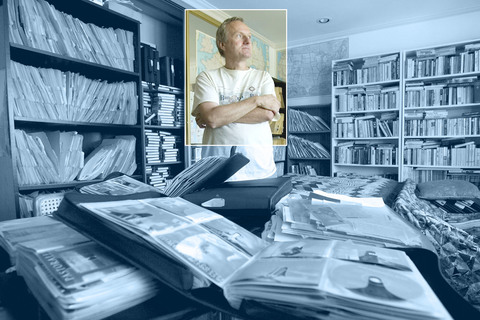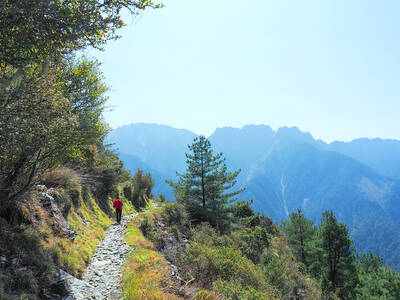Music magazine editors have few more tried-and-true formulas for boosting newsstand sales and Web traffic than best-of lists. Rolling Stone's 500 Greatest Albums of All Time; Spin magazine's 100 Greatest Albums 1985-2005; Pitchforkmedia.com's Top 100 album lists for the 1970s, '80s, and '90s: vast digests of gathered knowledge and opinion, usually the work of teams of editors, journalists, and musicians, painstakingly assembled.
But their collaborative efforts pale in comparison to the solo work of Piero Scaruffi.
In addition to his annual album rankings and all-time rankings (Captain Beefheart's Trout Mask Replica currently ranks No. 1), Scaruffi's multilingual Web site (www.scaruffi.com) has a list of the best rock bands and individual artists — best guitarist, best keyboardist, best male and female vocalists — of each year since 1955. A ranking of the 164 best jazz albums of all time, complete with 903 honorable mentions. A list of the 39 best “short” songs released from 1955 to 1979. The 119 best psychedelic albums of all time. The best all-time guitarists, drummers, and keyboardists.

PHOTO: NY TIMES NEWS SERVICE
For a one-man operation, the amount of material is staggering. And Scaruffi, 51, a freelance software consultant and occasional university lecturer living in Redwood City, California, also runs thymos.com, which contains his equally prolific writings on topics of consciousness and cognition. Not surprisingly, he says running the two sites has become a full-time job. “I barely have time to breathe,” he said in a telephone interview.
Before the hobby became the job, Scaruffi, who has a university degree in mathematics, from Turin, Italy, had worked in artificial intelligence and computers.
That's now a fallback when he needs the money. “If I need to buy a new car, then I have to go out and do software consulting,” he said in a light Italian accent.
His work dominates both his life and his living room. He recently transferred his many piles of books (a “vertical sorting method”) to 11 bookcases with six shelves apiece. Vinyl is kept in the garage, he said, and CDs — unless they are part of the “essential” pile near his desk — are housed in giant boxes around the house. The CDs can sometimes go unheard for several years before Scaruffi gets around to reviewing them, making his end-of-the-year lists a perpetual-motion machine.
Last month his site had 646,640 hits, according to a tabulator available on his site. The web traffic analyzer Alexa.com ranks scaruffi.com at around 59,000, below such established independent music blogs as Largehearted Boy (blog.largeheartedboy.com) but ahead of heavily linked favorites like You Ain't No Picasso (youaintnopicasso.com).
Scaruffi's music site is colorful but stark, consisting mainly of simple text with basic color backdrops, with limited advertising. The ads help cover the US$1,000 to US$2,000 a month he spends on CDs (adding to a collection of an estimated 20,000). The site's simplicity harkens back to Scaruffi's text-only electronic fanzine, first published for a group of 20 in 1985, back when e-mail was closer to Arpanet than to AOL.
His initial foray into electronic punditry was a function of his technological acumen and his prowess as a musical savant while growing up in Trivero, Italy. “When I was in high school in the early 1970s, I was the ‘expert’ on music,” said Scaruffi, who moved to California in 1983. For his senior project, he turned in a 50-page paper on the history of rock music. His classmates' papers, he said, totaled two or three pages.
“People were constantly asking for my advice: ‘Tell me what five albums I should buy now,’ or ‘Tell me what are the five best heavy metal albums of all time,”‘ Scaruffi said. “Eventually, you get tired of answering the same question, and you prepare a list. Then the list becomes many lists.”
He collected a good amount of his catalog of rankings and essays from the site in A History of Rock Music, 1951-2000, which was published in 2003 and has sold about 1,500 copies by his estimate. That same year, he also published Thinking About Thought: A Primer on the New Science of Mind, Towards a Unified Understanding of Mind, Life and Matter, which deals mainly with consciousness and artificial intelligence. His studies in those latter subjects have included terms as a visiting scholar at Stanford and Harvard and lecturing posts at, among other places, the University of California, Berkeley, where last year he taught The Nature of Mind (an introduction to cognitive science) and A History of Knowledge.
But visiting his site and reading his arguments against the Beatles' legacy (“Ray Davies of the Kinks was certainly a far better songwriter than Lennon & McCartney”) or his list of “Most significant works of music 1950-90” (equal parts Karlheinz Stockhausen and Cecil Taylor), readers could expect Scaruffi to be dedicated solely to developing a complete music compendium, a sort of musical Wikipedia without all the extra help. Not so, he said.
“Probably my biggest ambition would be to write a history of knowledge,” he said. “Something that packages all of my interests together: literature, science, philosophy, politics — whatever.” Music, he said, is just one part of a much larger puzzle.

June 9 to June 15 A photo of two men riding trendy high-wheel Penny-Farthing bicycles past a Qing Dynasty gate aptly captures the essence of Taipei in 1897 — a newly colonized city on the cusp of great change. The Japanese began making significant modifications to the cityscape in 1899, tearing down Qing-era structures, widening boulevards and installing Western-style infrastructure and buildings. The photographer, Minosuke Imamura, only spent a year in Taiwan as a cartographer for the governor-general’s office, but he left behind a treasure trove of 130 images showing life at the onset of Japanese rule, spanning July 1897 to

In an interview posted online by United Daily News (UDN) on May 26, current Chinese Nationalist Party (KMT) Chairman Eric Chu (朱立倫) was asked about Taichung Mayor Lu Shiow-yen (盧秀燕) replacing him as party chair. Though not yet officially running, by the customs of Taiwan politics, Lu has been signalling she is both running for party chair and to be the party’s 2028 presidential candidate. She told an international media outlet that she was considering a run. She also gave a speech in Keelung on national priorities and foreign affairs. For details, see the May 23 edition of this column,

One of the most important gripes that Taiwanese have about the Democratic Progressive Party (DPP) is that it has failed to deliver concretely on higher wages, housing prices and other bread-and-butter issues. The parallel complaint is that the DPP cares only about glamor issues, such as removing markers of Chinese Nationalist Party (KMT) colonialism by renaming them, or what the KMT codes as “de-Sinification.” Once again, as a critical election looms, the DPP is presenting evidence for that charge. The KMT was quick to jump on the recent proposal of the Ministry of the Interior (MOI) to rename roads that symbolize

Jade Mountain (玉山) — Taiwan’s highest peak — is the ultimate goal for those attempting a through-hike of the Mountains to Sea National Greenway (山海圳國家綠道), and that’s precisely where we’re headed in this final installment of a quartet of articles covering the Greenway. Picking up the trail at the Tsou tribal villages of Dabang and Tefuye, it’s worth stocking up on provisions before setting off, since — aside from the scant offerings available on the mountain’s Dongpu Lodge (東埔山莊) and Paiyun Lodge’s (排雲山莊) meal service — there’s nowhere to get food from here on out. TEFUYE HISTORIC TRAIL The journey recommences with